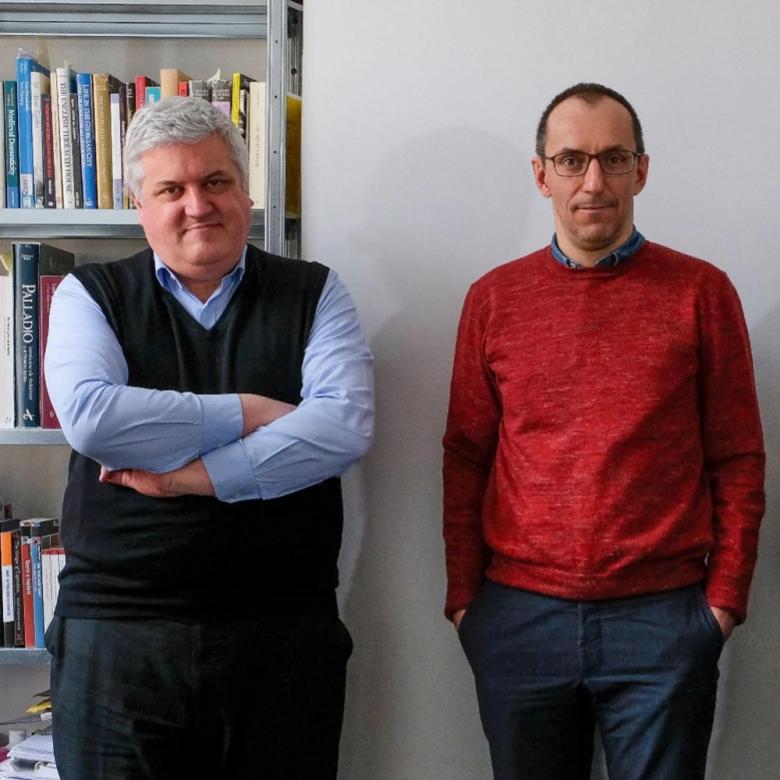Dogma Wins 2023 Jencks Award
Dogma, the Brussels-based practice of Pier Vittorio Aureli and Martino Tattara, is the 2023 recipient of the RIBA Charles Jencks Award, named for the influential architecture critic and landscape designer.
Given out annually by the Jencks Foundation and the Royal Institute of British Architects (RIBA), the Charles Jencks Award was established by the late critic Charles Jencks in 1992 as an exchange program between British and Japanese architects. Since 2003 the namesake award has recognized "an individual (or practice) that has recently made a major contribution simultaneously to the theory and practice of architecture," per RIBA. Other recent awardees, following a one-year cancelation in 2020 due to pandemic, are Eyal Weizman's Forensic Architecture and Indian architect Anupama Kundoo.
Dogma was founded by Pier Vittorio Aureli and Martino Tattara in 2002 and since then “has worked on the relationship between architecture and the city by focusing mostly on urban design and large-scale projects,” per the practice's website. Dogma acts as a consultant “to municipalities and agencies concerned with urban planning and architectural issues” but is also “intensely engaged with teaching, writing, and research, activities that have been an integral part of the office’s engagement with architecture.” Aureli and Tattara's exploration of the relationship between theory and practice is what has made them influential to professionals and students, and what garnered them the award.
“Few architects have had a greater influence on students’ thinking and representation over the last 10 years than Dogma. Through teaching, exhibitions, competitions and books, they follow a clear and uncompromising project to dismantle the relationships of architecture and capital. While Dogma have not built many projects, all of their work takes the material construction of buildings seriously, and has implications on the building profession. They are an important counter to the commercialized architectural profession, using their deep knowledge of architectural history and theory, to propose alternative ways for us to live together.”
In addition to the dozens of projects listed on their website, Aureli, who teaches at Ecole Polytechnique Fédérale de Lausanne (EPFL), and Tattara, who is on the Faculty of Architecture, KU Leuven, have written and contributed to numerous books, both as Dogma and individually. The former include Living and Working, recipient of a DAM Architectural Book Award in 2022, while recent examples of the latter are Architecture and Abstraction, a study in architectural history, theory, and practice by Aureli, and Contested Legacies: Critical Perspectives on Post-war Modern Housing, edited by Tattara with Andrea Migotto.
“We are truly delighted and honoured to receive this award. We are especially honoured because it is dedicated to Charles Jencks, whose practice combined history, theory and design, which are also inseparable aspects of our work. Over the last ten years, we have tried to put forward ideas to improve the way in which we live and work in our houses and in our cities, and have done this both through design proposals and by revisiting some of the most salient and often forgotten chapters of the history of our discipline. We would like to share the award with past and present collaborators without whom our work would have not been possible.”
In addition to prize money, the winner of the Jencks Award delivers a lecture at the RIBA in London. Dogma will speak at RIBA on May 16, 2024, when it will formally be given the award.
Previous winners of the RIBA Charles Jencks Award:
- 2022: Forensic Architecture
- 2021: Anupama Kundoo
- 2020: [No award]
- 2019: Débora Mesa and Antón García-Abril, Ensamble Studio
- 2018: Alejandro Aravena
- 2016: Níall McLaughlin
- 2015: Herzog & de Meuron
- 2013: Benedetta Tagliabue
- 2012: Rem Koolhaas
- 2011: Eric Owen Moss
- 2010: Stephen Holl
- 2009: Charles Correa
- 2008: Wolf Prix
- 2007: Ben van Berkel and Caroline Bos, UN Studio
- 2006: Zaha Hadid
- 2005: Alejandro Zaera-Polo and Farshid Moussavi, Foreign Office Architects
- 2004: Peter Eisenman
- 2003: Cecil Balmond
Related articles
-
-
Isabel Zumtobel: 'We Believe in the Power of Design to Change the Future for the Better'
World-Architects Editors | 18.11.2025 -
-
